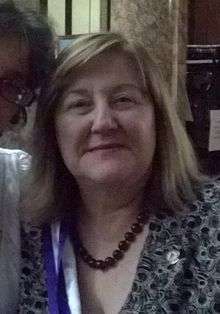Steph Key
| The Honourable Steph Key BA JP MHA | |
|---|---|
 | |
| Minister for Social Justice | |
|
In office 6 March 2002 – 5 March 2004 | |
| Succeeded by | Jay Weatherill |
| Minister for Housing | |
|
In office 6 March 2002 – 5 March 2004 | |
| Preceded by | Dean Brown |
| Succeeded by | Jay Weatherill |
| Minister for Employment, Training and Further Education | |
|
In office 5 March 2004 – 23 March 2006 | |
| Preceded by | Jane Lomax-Smith |
| Succeeded by | Paul Caica |
| Minister for Youth | |
|
In office 6 March 2002 – 23 March 2006 | |
| Preceded by | Mark Brindal |
| Succeeded by | Paul Caica |
| Minister for the Status of Women | |
|
In office 2 March 2002 – 23 March 2006 | |
| Preceded by | Diana Laidlaw |
| Succeeded by | Gail Gago |
| Member of the South Australian Parliament for Ashford | |
|
Assumed office 2002 (seat created) | |
| Member of the South Australian Parliament for Hanson | |
|
In office 1997 – 2002 (abolished) | |
| Preceded by | Stewart Leggett |
| Personal details | |
| Born |
13 December 1954 Woodville, South Australia, Australia |
| Nationality | Australian |
| Political party | Australian Labor Party (SA) |
| Alma mater | Flinders University |
Stephanie (Steph) Wendy Key (born 13 December 1954) is an Australian politician and member of the South Australian House of Assembly for the South Australian Branch of the Australian Labor Party since the 1997 election, representing the electorates of Hanson (1997–2002) and Ashford (2002–present).
Early life
Born at the Queen Elizabeth Hospital in Adelaide's western suburbs, Key attended the Largs Bay Primary, Port Adelaide Girls Technical and Marryatville Adult Education Schools before completing a Bachelor of Arts majoring in politics and sociology at Flinders University, where she was elected as the first female general secretary of the Flinders University Students Association.
Before entering parliament, Key worked as waitress, cook, cleaner and clerk, as well as a number of positions within the Transport Workers Union,[1] the Australian Council of Trades Unions (ACTU) and the United Trades and Labour Council of South Australia (UTLC).
Key also served as the director of the Working Women's Centre and as a member of the South Australian Housing Trust's board of directors.
Parliament
Key was elected as member for the electoral district of Hanson at the 1997 election, and immediately assumed shadow ministerial responsibilities for industrial affairs, youth affairs and assisting in multicultural and ethnic affairs. Changes in the shadow cabinet during 2000 saw her responsibilities change to housing and urban development, employment and training, local government and youth affairs.
The 2002 election saw they seat of Hanson abolished and Key was re-elected to parliament as member for Ashford.
With the election of the Rann government in 2002, Key became Australia's first Minister for Social Justice, with further portfolio responsibilities for community and disability services, ageing, housing, youth and the status of women.[2] Key has been attempting to decriminalize prostitution in South Australia., [3][4][5] SIN is supporting her efforts.
Key oversaw a comprehensive overhaul of South Australia's child protection laws and strategies to improve and sharpen the way in which Government responds to the needs and welfare of children in care.[6] During Key's term as Social Justice Minister, South Australian also saw the redrafting of anti-discrimination legislation and the Equal Opportunity Act.
Following a mid-term cabinet reshuffle in 2004, Key became the Minister for Employment, Training and Further Education while also retaining the youth and status of women portfolios.[7]
During her time in parliament, Key has pushed for progressive legislation. She is from the Labor Left faction.[8]
Electoral results
Key defeated Liberal Stewart Leggett in the seat of Hanson at the 1997 election with a 55.6 percent two-party vote. Hanson was abolished before the 2002 election and was replaced by Ashford which Key retained with an increased 53.7 percent two-party vote from a 0.8-point swing. Key increased her two-party vote to 66.1 percent, a two-party swing of 12.4 points, at the 2006 election. Key retained her seat at the 2010 election with a 54.8 percent two-party vote, despite suffering a 10.4-point swing. Key's two-party vote was reduced to 50.6 percent in a redistribution however she retained the seat at the 2014 election with an increased 51.9 percent two-party vote from a 1.3-point swing.
References
- ↑ Mayne, Stephen (25 January 2006). "Tracking the unionists in parliament". Crikey. Retrieved 28 April 2014.
- ↑ Statistical Record of the Legislature 1836–2007: Parliament of South Australia
- ↑ Selling sex in the city: Adelaide's illegal prostitution industry
- ↑ Sex industry won't give up
- ↑ Sex industry won't give up
- ↑ "Child protection overhaul to be headed up by QC – Ministerial" (2002-03-28)
- ↑ ABC News Online "SA Premier unveils Cabinet reshuffle" (2004-03-04)
- ↑ South Australian MP Steph Key weighs up her future: The Advertiser 17 September 2011
External links
| South Australian House of Assembly | ||
|---|---|---|
| Preceded by Stewart Leggett |
Member for Hanson 1997–2002 |
Succeeded by Seat abolished |
| Preceded by Seat recreated |
Member for Ashford 2002–present |
Incumbent |